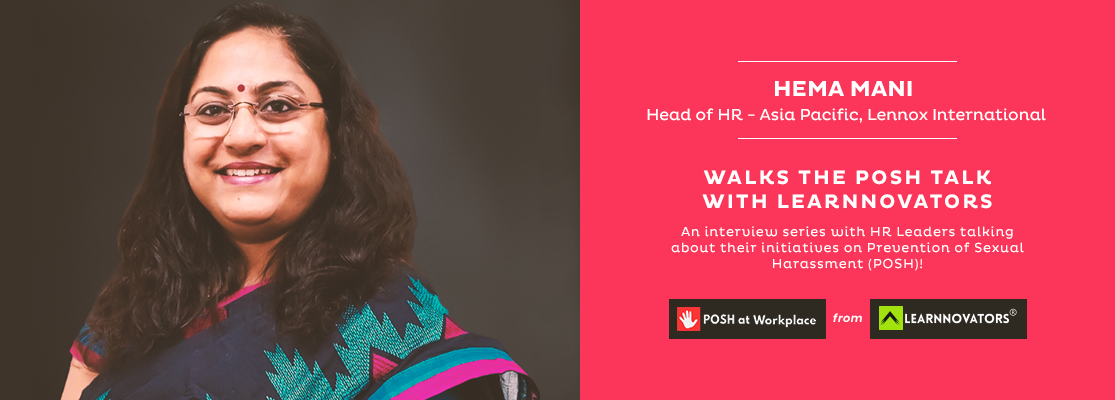ABOUT HEMA MANI:
Hema Mani is Head of HR, Asia Pacific at Lennox International. She has over 25 years of experience in a Strategic Human Resources capacity, with wide-ranging multinational experiences from Kelly Consultants, PricewaterhouseCoopers, Jain Group of Institutions, i2 Technologies and Honeywell. She is a certified Korn Ferry Leadership Architect, Lean Sigma Green Belt Assessor and certified OD Facilitator.
She is committed to the cause of diversity. She has recently launched the LGBTQ+ initiative at Lennox India.
Hema is the chairwoman for the CII-Indian Women Network in Chennai, and as part of her role she is focused on developing leadership talent among women, mentoring initiatives, gender parity diagnostics & facilitation in corporations and POSH activities.
She also has been an active volunteer and Meditator with Isha Foundation.
ABOUT THIS INTERVIEW SERIES:
Walking the POSH Talk with Learnnovators is an interview series that features outstanding HR leaders who are pioneers of workplace practices that ensure safety, equality, diversity in their organisations. Specifically, these HR leaders share their experiences related to the implementation of Prevention of Sexual Harassment (POSH) compliance within their workplaces.
Join us on this exciting journey as we learn from their successes, as well as their setbacks and challenges, and seize the opportunity to hear their unique perspectives on the subject.
This initiative is part of Learnnovators’ commitment to helping organisations in India make their workplaces safe for their women employees.
THE INTERVIEW:
1. LEARNNOVATORS: Hema, it’s a pleasure to have you here today to discuss your experiences dealing with and eliminating sexual harassment at your workplace.
Lennox, being a company that considers safety and well-being as a primary objective, how do you go about making your workplace safer for your employees (especially women employees)? What were your struggles and how were you able to overcome them? In short, how has Lennox India’s POSH journey been so far?
HEMA MANI: Lennox, as an organization, has left no stone unturned to nurture a work culture that ensures utmost dignity and satisfaction of employees. As the company is growing with more and more female employees, the increasing diversity and the shift towards a less formal work environment have made the organization focus more on the Internal Committee (POSH Committee). This has in turn nudged us to strengthen periodic trainings and make the POSH Committee an independent body with the power to take decisions on matters of sexual harassment without the interference of the organization.
2. LEARNNOVATORS: In a recent post, actress Margot Robbie says she didn’t fully understand the meaning of sexual harassment until she read the script of her new movie “Bombshell”. There are a huge number of young employees who are not even aware of what constitutes sexual harassment at work, and the options available to them for redressal. This reiterates the fact that creating awareness is the most significant step in any POSH initiative. As per this Deloitte India’s ‘Creating a safe work environment – Best practices to deal with sexual harassment at the work place’ survey report, around 71% of respondents to the survey identified ‘making information available on their company’s intranet or HR portal’ as the most preferred way to spread awareness about sexual harassment and preventive behaviors. However, 52% of the respondents indicated their preference for training programs as most effective for helping employees understand what constitutes sexual harassment. What kind of POSH awareness interventions have you been carrying out in your organization? What mechanisms are in place to raise awareness and encourage discussions around sexual harassment at your workplace? What methods would you recommend for other organizations who have just got started or planning to get started?
HEMA MANI: At Lennox we follow various practices:
- All employees are made to attend mandatory trainings on the POSH Act. In addition, there are additional trainings that managers and the Internal Committee undergo.
- Employees are expected to complete a mandatory training on Code of Conduct every year.
- Employees were made aware of the IC Committee members through a formal email introduction and also through department all-hands meetings, thereby creating visibility for the POSH Committee.
- In addition, the Posh Act and its importance and the introduction of the Internal Committee members are made part of the new joiner orientation program.
- A POSH-specific e-mail ID has been made available to employees, who can directly reach out to the Committee for any grievances.
3. LEARNNOVATORS: Under the POSH Act, there is not much that the Internal Committee (IC) can recommend legally if a complaint comes up against an existing employee more than three months after the incident. This arrangement limits the IC’s role to merely offering moral support in such scenarios. Have you faced any such situations so far at Lennox India? If yes, how did you address them? If no, what strategies would you follow if they happen in future?
HEMA MANI: No. We have not faced any such incidents. As a strategy, we will support the complainant and help him/her with all the possible solutions to deal with this and also encourage them to pursue the legal route in such scenarios.
4. LEARNNOVATORS: As per a recent survey finding, “87% of the women working in tech firms would resign from their job if faced with any incident of sexual harassment.” What are your experiences in this regard? What measures are in place at Lennox India to prevent any untoward incidents?
HEMA MANI: At Lennox, we have a very able and diverse Internal Committee which is an independent body that has been accorded power according to the POSH ACT to decide on matters of sexual harassment at the workplace. The very fact that we have made this committee very transparent/confidential and an independent body itself has created a culture in the organization where employees can feel confident to go ahead and raise a complaint if they feel harassed. Also on the other front, we have campaigns like Green Dot/Red Dot which focus on safety and workplace harassment – Do’s & Don’ts. This workshop has been done for each and every team across Lennox to empower employees at any level to stand up to anything inappropriate and use strategies learnt to deal with such issues. So, this has ideally given employees a sense of power to be able to stand up for themselves in these situations while having the Internal Committee always to fall back on or to escalate. These are strategies that we follow at Lennox to prevent untoward incidents.
5. LEARNNOVATORS: To quote this case study, “Indian companies reported more cases of sexual harassment in FY 2019 compared to a year earlier. Data from BSE 100 companies showed a 14% increase in reports of sexual harassment complaints in FY 2019.” Would you agree that, despite the growing numbers, the fact that there’s increased POSH awareness is a positive sign? If not, how else would you look at it?
HEMA MANI: Increase in sexual harassment cases in Indian companies is very unfortunate, but the fact that more cases are being reported is a sign that there is increased awareness for the employees on the POSH Act. It also shows that they are aware of what to do when they face such harassment at workplace and overall are of the belief that they don’t have to suffer in silence rather there is a mechanism to take out the perpetrators. #MeToo is a classic example – the powerful, or be it anyone, cannot get away with crimes. That being said, we are on the right track but still a long way from being able to provide a conducive environment for working women. The key to that would be consistency in sustaining diversity related efforts as we continue in this journey to make the world a more inclusive place.
6. LEARNNOVATORS: As per a recent view, there is a recommendation to ensure that half of the total members of the Internal Complaints Committee (ICC) need to be women, and in the case of multinational companies, to include members from the Indian branches. What do you think of this recommendation to ensure equal representation of women in the ICC? Is your ICC already designed this way to ensure equal women representation? If yes, what benefits and challenges have you experienced with this arrangement so far?
HEMA MANI: 9 out of the 14 members of the IC Committee at Lennox are women. We have a separate IC Committee for the Indian organizations which is comprised of employees working from our Chennai, India office. The benefit that we see with more women in our IC Committee is that we are able to bring solutions to problems related to harassment of women in a swifter manner. This in turn encourages women employees to speak up if they face any issues.
7. LEARNNOVATORS: As we know, we are undergoing a dramatic shift in the way we work today, and one of our major challenges is to ensure the safety of our women employees working from their homes. As per reports, newer, subtler forms of sexual harassment seem to be on the rise. However, our workplace safety frameworks remain largely untouched. How successful have you been in revisiting your POSH policies and processes to accommodate the needs of your remote workers? What strategies do you find working, and what not so well?
HEMA MANI: We, at Lennox, have recently completed POSH awareness training sessions for employees on the various scenarios that could come up from a harassment standpoint while working from home. We brought in awareness through incidents that have happened in the industry where employees were working from home, and also ended the session with giving them with some best practices as well by reiterating the point – whether working from office or from home, they can always reach out to IC Committee for any help & guidance regarding such matters.
8. LEARNNOVATORS: When it comes to POSH initiatives, people in key positions can not only influence those within their organizations but also inspire the outside world to take action. In this context, it is inspiring to see messages (such as this one from Anand Mahindra) that advocate taking a firm stand to ensure a zero-tolerance policy against sexual predators at workplaces. What is Lennox’s tolerance policy on POSH? How engaged is your management in influencing your POSH initiatives? What would be your message to people in key positions to walk the POSH talk?
HEMA MANI: At Lennox, the tolerance policy for cases registered under the POSH Act is absolutely zero. For any reported incident that is proven, the organization stands by the POSH Committee’s & Ethics Committee’s decision on the matter, irrespective of the seniority and position of the employee. There is absolutely zero interference in this regard. At Lennox, the top management walks the POSH talk by regularly standing together with the POSH Committee, providing training and awareness sessions on the POSH Act, and making LITC a safe and inclusive place to work.
9. LEARNNOVATORS: To quote this The New York Times article, “Women are living in a world that’s made for men. Whether it’s the cars they drive or the medicines they take, they’ve almost all been developed with men in mind. And that can have life-threatening consequences for women.” At the same time, we are also inspired by this news that talks about how Unilever has achieved 50/50 gender balance across its global leadership team. Interestingly, we also see other organizations such as Etihad Airways following suit by pledging to increase its female workforce over the next few years. In this context, it is interesting to note that you attach a lot of importance to diversity and inclusion not only in your workforce but also in your leadership team. How do you help realize Lennox’s vision of making your workplace not just safe but also inclusive for women?
HEMA MANI: The state of workplace gender equality, diversity and inclusion at Lennox is progressing very well but we still have a considerable journey to make in order to have far-reaching effects on everything from employee well-being and retention to innovation and business outcomes. It is undoubtedly something Lennox gives the utmost importance to.
At Lennox, we have the Gender & Diversity Council, where gender diversity is a key focus area, which is committed to the empowerment of women. Our overall D&I Strategy also focuses on strengthening our LGBTIQ+ community, harnessing our cultural diversity, supporting our multigenerational workforce and being an accessible workplace for everyone. At Lennox, right from hiring out to leadership roles within the organization, we always make sure that we have a diverse set of people (gender-wise) in these positions to have a very inclusive workplace for women and others.
10. LEARNNOVATORS: You say, “One is to spend millions of dollars on Best In Class Benefits, another one is for leaders ‘Walking the Talk’ and demonstrating the intent and sincerity towards individuals.” As somebody who believes in changemaking, not just by talking, but by walking the talk, we would like to have your thoughts on the recent view to widen the scope of the POSH Act to also include harassments related to gender bias (discriminatory acts that may not be of a sexual nature) happening at workplaces. Since we do not have any specific legislation for preventing or redressing these types of harassments, would you agree with the suggestion? If not, based on your experiences at Lennox India, how do you think a system can be established within the country to help women handle these challenges at work?
HEMA MANI: I agree that gender bias is prevalent in the corporate society and it is something that all of us should unite and work towards eliminating. As I write this, at Lennox we have an “Unconscious Bias Workshop” that is going to be rolled out to all employees across the organization, and a key element of that is the gender bias at workplace that is being led by our CEO. Also, at Lennox we have a very strong Ethics Committee, – an independent body led by the Legal Counsel which is authorized to make decisions on such cases thereby making the organization a safe place to work.
One suggestion that I would want to give, and this has been based on my experience, is to have more women in leadership roles in the organization as that would help mitigate gender bias and also help in creating a more inclusive approach from the top management.
11. LEARNNOVATORS: As we understand, you recently facilitated a Basic Certificate Workshop under the National HRD Network (NHRD) (a non-profit committed to the development of human resources through education, training, research and experience sharing) on Workplace Harassment titled ‘Gender Neutral Approach to Prevention of Sexual Harassment at the Workplace Act, 2013’ for working professionals in our country. As a person who is obsessed with the idea that “Human is Not A Resource”, and believe that “the time has come for us to repackage this (HRD) function”, would you agree to the thought that our POSH Act that is NOT gender neutral since it protects only women, is in dire need of a makeover?
HEMA MANI: As a person who believes in diversity and inclusion and working for a company where we have our CEO and the entire company who take inclusion as a must have, I must say this is a match made in heaven.
Lennox as an organization truly believes in being gender neutral in everything that we do, right from our policies. Thus, working for such an organization and personally always wearing an inclusion mindset, I believe that it is time to make the POSH Act gender neutral.
12. LEARNNOVATORS: It is inspiring to know about Lennox’s Feel the Love program that you’ve dedicated to giving those in need the perfect air they deserve. We find it also interesting to read about the slew of measures you have been implementing to ensure the welfare of your employees. It’s no surprise that in this 10th year of Lennox in India, you won the ‘Great Place To Work’ certification from the Great Place To Work Institute (in addition to the recognitions you have received for your innovative HR practices). What would be your message to inspire companies to make their workplaces preferred by women as a ‘Great Place To Work’?
HEMA MANI: Thank you! In lieu of this, we would like to highlight certain things that we follow at Lennox which might inspire other companies to make their workplaces a great place to work for women.
- Recruiting and promoting women leaders for leadership positions across the organization.
- Updating our policies – we constantly revamp and update our policies and benefits to cater to the needs of the working women to make our organization more inclusive.
- Creating forums and community groups within the organization that advocate for women.
- Making returning to work after maternity easier and seamless through the ‘Mom back to work’ program.
- Living the values that you believe from the time of interview to the entire employment life-cycle of the woman employee.
LEARNNOVATORS: Thanks so much for your time today, Hema. It was amazing time listening to your insights on dealing with workplace harassment. The community will immensely benefit from these takeaways. Thank you!






